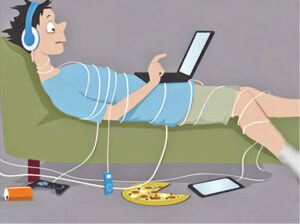Waking up and reaching for the phone has become second nature to many. But, is this good for you? While a scroll down your social media at various intervals may seem like a good way to pass time, there’s often a thin, blurry line between a hobby and an addiction.
It’s common for both – youth and adults – to feel a need to constantly be ‘plugged in’ to social media and the internet. This often leads to a fear of missing out (FOMO in millennial-speak), and this coupled with the neurological changes that take place in the brain while being online, ‘Technology Addiction’ falls into a category of addiction termed behavioural addictions. Behavioural addictions are widely recognized by mental health and addiction professionals and include other behaviours such as gambling and sex. A behavioural addiction is characterized by a progressive inability to control, regulate or limit the behaviour. Technology addiction also shares similarities with obsessive-compulsive disorders.
Our modern world is characterized by increasing connectivity and technology usage. However, some of us cross from normal usage into a darker area, in which technology has a negative impact on daily life like school, work, family, and social life. Technology addiction includes an addiction to video games, social networking and surfing the web, among other things.

How Technology Addiction Impacts The Brain… On a neurological level, technology addiction operates similarly to chemical addictions, in that, expectation followed by reward leads the brain to release dopamine and other feel-good chemicals. This reward might be winning a level of a video game or getting ‘likes and comments’ on a picture. Over time, a person begins to crave this dopamine release and often requires increasing stimulus to get the same effect.
While chemical addictions often have a magnified effect by blocking the re-uptake of these feel-good chemicals so that they stay in the brain longer and more powerfully, researchers are finding that the inconsistent rewards often associated with behavioural addictions, like gambling and video games, also increase the flow of dopamine.
Signs Of Technology Addiction…
Though spending excessive time on digital devices can be a sign of a technology addiction, frequency and duration of time spent on digital devices, in itself, does not necessarily denote a technological addiction. Many professionals in the field of mental health and addiction view digital addictions as a stand-alone mental health disorder. The American Society of Addiction Medicine has acknowledged that addictions are not limited to drugs and alcohol but can also be behavioural in nature. The cornerstone of all addictions is loss of control, changes in mood, tolerance, withdrawal, and continuation of use despite adverse consequences, all of which are criteria that a digital dependence can meet. More importantly, a technological addiction is apparent if and when digital usage interferes with one’s daily life and general wellbeing. Some signs of a technology addiction include:
- Inability to moderate or abstain from technology or a specific digital medium.
- Compulsive technological use or experiencing cravings and urges to use digital devices.
- Neglecting important life areas such as work, school or relationships at the expense of technology.
- Continuing to use digital devices despite it contributing to consequences in your life.
- Losing interest in social and leisure activities that you once enjoyed.
- Using digital devices in dangerous situations like while driving a car or walking across a busy street.
- Experiencing unwanted mental health symptoms such as feeling low, anxiousness, stress or irritability at the expense of technological usage.
- Using digital devices to induce pleasure or experience gratification.
- Lying or hiding digital usage from family, friends or colleagues as a result of guilt or shame.
- Using digital devices for longer durations than intended or finding yourself using digital devices with increased frequency over time.
Impact Of Tech-Addiction… Problematic and excessive use of technology often significant impacts one’s daily life. A person’s employment performance or academic standing may fall, and relationships with family members, friends, and romantic partners may be impacted negatively. A person could experience health concerns as fatigue, headaches, backaches, or carpal tunnel syndrome. Mental health concerns like as eating and food issues, depression, stress, and anxiety may also be associated with Internet addiction. Late-night log-ins are likely to disrupt sleep patterns and may lead to fatigue and long-term sleep deprivation which impacts health. Additionally, those addicted to the internet may become isolated as a result of the experienced addiction.
Treatment of Tech-Addiction: Currently, internet addiction is not a diagnosis in the Diagnostic and Statistical Manual. However, it is believed to share similarities with impulse control disorders and gambling addiction. Unlike other addiction treatments, researchers agree that completely avoiding the internet isn’t effective. Instead, the treatment should focus on time management and balancing or controlling use. However, it may help to avoid certain applications if they’re the cause of your addiction. Treatment strategies generally include:
- Suggesting a new schedule to disrupt patterns, using real events and activities
- Setting goals to help limit use time
- Quitting use of specific applications
- Reminding yourself the benefits of stopping
- Creating an inventory of missed activities due to excessive use of internet or technology
- Joining a support group
- Engaging in family therapy
Treating technology addiction could be a combination of therapies. Talk to a mental health care provider about your options, if you suspect you or someone you know has technology addiction or is struggling with moderation.
- જેજે હોસ્પિટલના પારસી વોર્ડમાં નવરોઝની ઉજવણી - 5 April2025
- ઝોરોસ્ટ્રિયન વિમેન્સ એસોસિએશન ઓફ સુરત દ્વારા પાણી બચાવો પર્ફોર્મન્સ - 5 April2025
- આવાં યઝદના પરબની ઉજવણી - 5 April2025
